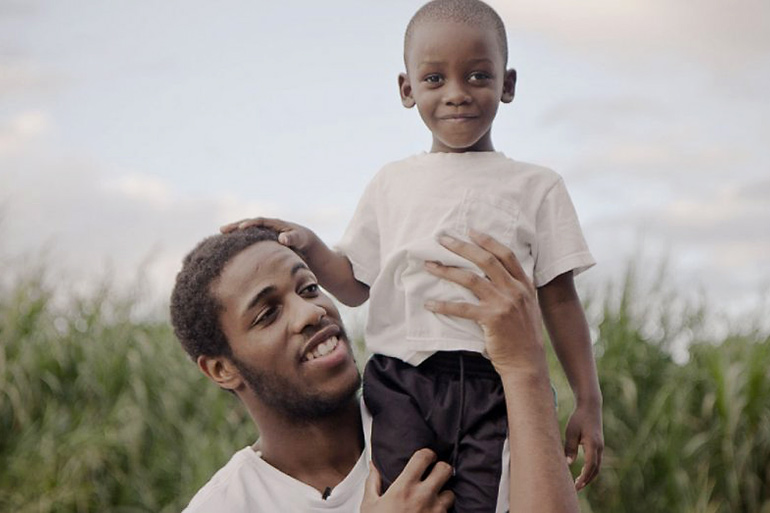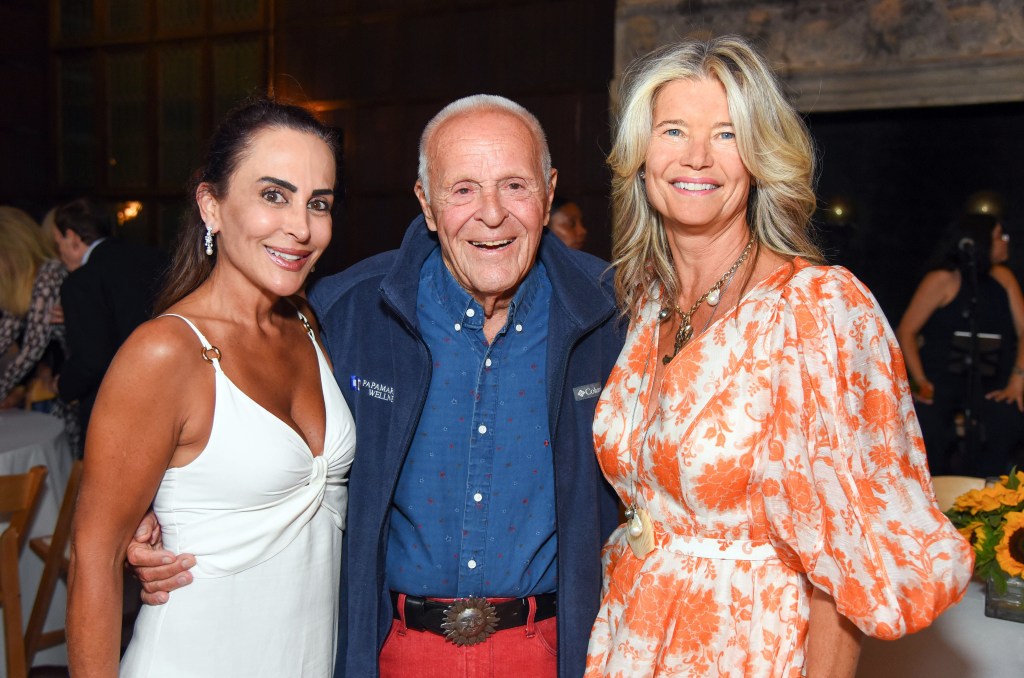Danny Peary Talks to 'Phantom Cowboys' Director Daniel Patrick Carbone

At the 2013 Tribeca Film Festival, I interviewed NYU film grad Daniel Patrick Carbone for his lovely debut feature, Hide Your Smiling Faces, about two boys dealing with a gun tragedy in rural upstate New York. I had no idea that he had been simultaneously making a documentary, this one about three boys who live in small, faded industrial American towns.
It would take him five more years to finish his documentary, in which Nick of Trono, California ages from 17 to 23; Larry of Pahokee, Florida, ages from 13 to 20; and Tyler of Parkersburg, West Virginia ages from 18 to 25. So it was with great delight that at this year’s festival, I spoke to Carbone again about his enlightening debut documentary, Phantom Cowboys.
The synopsis in the press notes: “Part time capsule, part folk song, Phantom Cowboys follows three teenage boys as they approach adulthood in vastly different parts of the United States. Moving fluidly between the deserts of California, the valleys of West Virginia, and sugarcane fields of Florida, the film explores the lives of these young men during two formative periods—transitioning forward and backward in time over a span of eight years. Larry, Nick, and Ty navigate their teenage and early-adult years through a series of interconnected vignettes, candidly narrated in their own words.” The towns are fascinating and so are the boys.

Danny Peary: It’s interesting that you were “secretly” working on this documentary when I interviewed you in 2013 about your narrative, Hide Your Smiling Faces.
Daniel Patrick Carbone: I know. I started Phantom Cowboys in 2009 when I was 24 or 25.
DP: Was this also an NYU-Tisch School of the Arts project?
DPC: No. One of its producers and I went to school together, but it wasn’t a student film. I started it right out of school.
DP: People who make narrative films rarely go back and make documentaries.
DPC: I have always loved both, and I’d love to continue to do both. Phantom Cowboys started before Hide Your Smiling Faces even had a script. I did a pause on it to do that one, and they were made in parallel time rather my switching from one to do the other. I had a foot in each film.
DP: Explain your title.
DPC: The title was something we landed on very early, and it stuck around. The longer you work with something under a certain title, the more it fits. I also came up with the title Hide Your Smiling Faces early and let the film grow into the title in a way. That’s what happened with this. You start to notice not just visual cues that align with “phantoms” and “cowboys”—obvious images that are conjured up with those words—but also the idea of a masculine ideal versus the reality of what young men face when growing up today.
The word “cowboys” really stuck because these three towns where I filmed are kind of hanging on to the past. Trono, California, Pahokee, Florida, and Parkersburg, West Virginia, aren’t ghost towns but are decades past their peaks financially and culturally. Back in the 1940s and 50s, cowboys represented American men—like the Marlboro Man—and these guys are my addition to the conversation about what American men are like in the modern day.
DP: Was Phantom Cowboys inspired by Michael Apted’s Up movies, in which he revisits his British subjects every seven years?
DP: Not originally. I’m a huge fan of his and those documentaries but this wasn’t initially planned to be this long an experience. It was always going to be a long study but it was going to be continuous over just a couple of years. There wasn’t going to be a big jump forward in years and dueling timelines. To be honest, it was started very casually with us filming at the three locations and then coming back home and deciding Nick, Larry, and Tyler would be our main characters.
It was an on-again-off-again project, depending on when we could get some funding and had free time to go back to those places and shoot a bit. It was really kind of a “let’s keep it going and when we’re done we’re done.” That’s part of the reason that it snowballed but I’m glad it did because I think so much of the strength of the final version is to not just hear them as kids talk about their expectations for when they’ll be adults but to actually see how it panned out for them, to see how it differs from what they said years before.
DP: How did you get the trust of your subjects?
DPC: Just by standing off to the side and letting them come to us. We didn’t come in with cameras blazing. We went to the places we thought we might want to film, where kids would naturally go, and started filming with them. It was just as much their trusting us as us trusting them. We got Larry’s parents’ permission because he was only 13 and we needed permission to shoot his friends. For all the minors’ we shot we needed adult permission. Nick was 17. Only Tyler was 18. They were all over 18 the next time we filmed.
DP: Did you stay in touch all through the years?
DPC: Yeah, pretty much. The biggest stretch between filming was probably about two years, but even then we were in touch and stayed up-to-speed.
DP: Did they ask you why you thought they were good subjects for a movie?
DPC: All the time. And it was a hard question to answer. When we went to those towns we didn’t try to find star basketball players so we could watch them rise; we wanted to know what would happen if we found three ordinary kids.
DP: So are they ordinary as in “typical”?
DPC: I think so. It’s hard to call anyone’s life ordinary because, as you see in the film, if you dig deep enough into anyone’s story it becomes compelling. Still they are ordinary in that their ambitions fall in line with those of a lot of people their age in the places they grow up. All humans have the same urges to put down roots and to find an identity and to feel comfortable where they are, so in that sense they are ordinary. They have goals, and they have roadblocks that other people put there or they put there themselves.
DP: In my introduction to our 2013 interview about Hide Your Smiling Faces, I included a quote by you when I wrote: “His debut feature, which is full of not-always-connected moments and scenes, not unlike how we recall memories of our childhoods, has ‘a natural structure like that of a dream, fragmented but always fluid.’” That could be said about this film as well.
DPC: You found me out! Yes, absolutely. To me, there were always some obvious parallels between the two films—for instance, the focus on male characters and small-town American life—but it was only after it was finished and people were telling me their interpretations of the film that I saw there were many more parallels, not just in regard to subject matter but to the structure and pacing.
DP: I also wrote in that five-year-old intro about your “poetic, haunting, challenging film.” That also describes this.
DPC: Yeah, you could say Phantom Cowboys is a nonfiction complement to that other piece.
DP: Could you have included the older, teenage boy in your narrative, if he were a real person, in your documentary?
DPC: How interesting. I think he would fit. The only thing that might preclude him from being in this film is that I focused on industry as the bedrocks to the three towns where my subjects live. I was going for boom towns that were past their primes. The rural town where the boy and his younger brother live in Upstate New York doesn’t have that element. But, yeah, in terms of upbringing and geography, it would be a really interesting exercise to include him.
DP: I’m struck by this line in your Director’s Statement: “The film’s structure is inspired by human memory.” But doesn’t Phantom Cowboy being a film, a documentation of your subjects, separate it from memory?
DPC: Yeah, it’s definitely different, but the important part of that quote is “inspired by.” It’s impossible to truly replicate that feeling of memory, but when I think back on my childhood I have these fleeting glimpses of certain moments here and there and the older footage really, for me, takes on that form. We aren’t necessarily getting from Point A, which is the footage of the boys when they are young, to Point B to, finally, Point C, which is the footage of them now. We’re instead getting fleeting glimpses of the seeds that might have grown into who they are today.

DP: I was thinking of how all home movies of past times make us feel nostalgic. As we watch, we think about what has happened since to those people on the screen, including deaths. When I see 13-year-old Larry in the sugarcane fields with a precocious friend, Randy, who is going to die young, it takes away the nostalgia and the innocence.
DPC: Absolutely. It is like home footage for me. I was in those towns, I was filming, I was right there with those kids. In some ways, those memories are also my memories. That’s what I love about that old footage. But it’s hard to be watching that footage of Randy to be honest. It’s hard to have had such a level of trust from someone and then to put it out there in the world—and then all you can do is feel you have done justice to his memory. I saw it as my responsibility to be honest and have integrity. That’s why it was important for me to include that footage of Randy. His death was traumatic for everyone involved.
DP: Your film has a number of scenes in which the National Anthem is played, such as before a football game and before a car race. My sense is that you were showing how Americans who are off the grid and pretty much forgotten remain faithful to the flag.
DPC: Definitely. I came from a pretty small town in New Jersey, though not like the three towns in the film, and when I go to places like this, I feel a kinship because of the small populations. However, it’s a different experience and I’m sensitive not to put too much editorial comment into the film. So while it was intentional to include the National Anthems, the audience can read into it what they wish. I will say there is a forgotten element to these towns but if you talk to the people there, most of them are quite happy to be there.
Even those with opportunities to leave have stayed for one reason or another. Like Nick, who could have played college football in Washington state. It’s important for me not to include anything judgmental about these places or the reasons people don’t leave. Yet it’s also important for me to put these towns on the big screen to be seen by people in New York City and other places that are polar opposites. I wanted there to be a sense of integrity so my characters are represented by their own words.
I edited the film in a certain way and chose to leave out hundreds of hours of footage that I took of these three guys, and I realize there’s no such thing as a truly objective documentary, but to the best of my ability, I tried to give an honest portrayal of these guys. They might not like it all but I think they’d see the film as fair.
DP: Have any of these guys voted?
DPC: I don’t know the answer to that. It’s an interesting question. I doubt if Larry did. I’m not sure he is allowed to vote. It never came up. Everything is inherently political today because of the way the world is moving now, and I knew that would be people’s first reading of this film. We wanted to lean into the cultural elements in these stories, but we weren’t shooting during the election in 2016.
DP: At the same time you were trying to be objective, were you ever tempted to ask any of your subjects, “Don’t you feel that you’re trapped in this town and are leading unfulfilling lives?” and offer advice? I ask because you’re older than your subjects and their friend and might want to help them see things more clearly.
DPC: We definitely asked them that question but we didn’t have to tell them what we thought. They’d heard what outsiders think of their towns. Trono, California is on the tourist path to Death Valley so people know it and pass through. If an outsider looks at your life and asks, “Why do you stay here when you have other opportunities?,” what do you say?
As I said, I came from a small town and a lot of my friends are still living there. So I wouldn’t say to my subjects that staying is necessarily the wrong decision, because it might be right for them. I gave them the opportunity to say why they choose to be in their towns. I didn’t want their answers to fit any agenda I had.
DP: Of course we viewers do form opinions about your subjects from watching your film. I think Nick was afraid to leave the security of his town when he had the opportunity and now will never leave; I think Larry definitely should have left but was trapped; and I think Tyler may have made the right decision to stay because he has the nicest wife in the whole world, great kids he loves very much, a house, and the only job—racing cars—he’d ever want to have no matter where he’d live.
Tyler may indeed have found the “slice of heaven” he has always desired. With Tyler, and perhaps Nick, who has an okay-paying job at the very plant he didn’t want to wind up working in, I think of how it is finding an isolated tribe in the jungle and telling the happy people that they should leave for civilization and experience real life.
DPC: Exactly. I don’t ever want to go on the record saying whether I think they made the right or wrong choice in their lives. But specifically about Ty, I didn’t expect him to be unsuccessful or have a downward trajectory after we filmed him when he was 18, but we stayed in touch with him and I was surprised that he became more and more successful in his racing.
I wasn’t sure how successful a driver could be racing in that small dirt-track circuit. He makes a good living racing and owns part of a garage now. He has four kids instead of just one and they are all well-fed and happy. He was the one of the three kids who seemed to have a pie-in-the-sky dream and he has come close to realizing it.
Every time I talk to him, he has won another big race. I’m happy for him. He was the one who I thought would have an even trajectory and Nick ended up being the one who has stayed exactly where he was.

DP: And Larry’s life went nowhere good, which was kind of predictable considering that there were few opportunities for him.
DPC: Larry obviously had some serious issues. We could talk about the opportunities for him as an African American in Florida, versus those for Nick in California and Tyler in West Virginia, and how they’re have been institutional reasons for why things happened as they did for him.
DP: Even in prison, he has the same happy-go-lucky smile he had at 13. And he was probably the one with the most ambition, including pleasing his mother by going to college.
DPC: Yeah, he has always had a great attitude. We interviewed him as an adult after he got out of prison for the first time. And we interviewed him again when he was back in prison. It seemed that the second time was the kicker for him. I felt a real difference in him. Going back to prison was a wake-up call. He was released late last year and is doing great. He has a construction job two hours away in West Palm Beach, and he moved with his mom.
DP: Viewers will be happy to know that because he was a sweet boy running through the sugar cane fields and catching rabbits, and he seems unchanged at 20.
DPC: He was 13 in the older footage, several years younger than Nick and Tyler. His turn from boy to adult is to me the most impactful. Not only is he two feet taller, but also he has grown so much psychologically in the seven years. He was imprisoned for four years the first time, from when he was 14. He’s 21 now, having spent six years in jail.
DP: As he says in your movie, he’s still young.
DPC: I love that about Larry. I don’t know how I’d be after going through all that and he still has that same drive and optimism, and to him prison was just a minor setback.
DP: Have your three subjects seen the movie? I’m really curious how they’d react to looking back seven or eight years to how they then saw their futures, particularly Nick, who really saw the need to leave town after he graduated from high school.
DPC: Larry hasn’t told me yet whether he has seen it, but they’ve all had the opportunity to watch it. Nick saw it the other night. More than the other two, I say to him, “Remember when you said this?” He had a lot of one-liners in his young scenes, so I can say, “How do you feel about what you said now?” Because he said, “I’m never going to work at the plant because that is a dead-end future.”
He tells me he likes working at the plant, but he can be a really hard guy to read. He’s always positive and on-board with everything, a real team player. I’m sure it’s difficult for him to watch some of that stuff, especially on the big screen, and having his story being juxtaposed with two other stories that he had nothing to do with during all these years. I think the biggest surprises for the guys is not just seeing their own lives on screen but seeing how they compare to the lives of strangers they’ve never met.
DP: Michael Apted’s Up series is made up of one great documentary after another. However once his subjects hit middle-age, they don’t change much over the next seven years. Watching your film, I was thinking that your subjects are young yet I don’t anticipate much change over the next seven years.

DPC: That’s interesting. I think that might be true. Ty was the one who took the idea of a big life change most seriously. Maybe it’s because he’s the oldest; he’s 25 and has four children. He’s the one I’d think might want to get out of his town, eventually.
DP: Probably to earn more money than he can in West Virginia.
DPC: Yes, making more money would probably be the main reason he’d leave. That’s true with most people. I had the same reaction as you watching the Michael Apted films—the later ones are just as well made but the subjects became less interesting once they hit 49. It’s hard to say what will happen with these guys. I’m not quite that interested in committing that much energy into their stories but I’d love to check in on them in a couple of years to see how things have panned out. Every time we talk to them we end up talking about the next step in their lives.
DP: Do these kids have denial?
DPC: I think there’s denial but I have a lot of denial every day about the tiniest things. It could be a good thing. We sometimes we have our greatest achievements because we don’t overthink them or talk ourselves out of doing them. They have denial but it’s perfectly acceptable and normal and protective for men their age.
DP: Would your three subjects get along?
DPC: I think so. All are nice guys. I’ve been around them during their down times so from that I’d say they’d get along but I’m not sure they’d naturally gravitate toward each other. They might not want to hang out because they have different interests.
DP: In the press notes, you say how you became a better filmmaker during the course of making this film. So doesn’t that mean your later stuff is better than what you filmed seven years before?
DPC (laughing): No, no. Sure it’s better in that I’ve had more experience and know a little better what works and what doesn’t, but I wouldn’t pretend to be an expert by any stretch of the imagination. It’s less about doing the early scenes better than having a different aesthetic now. Also, I was the DP on the early stuff and not on the later scenes.
DP: How does it feel to be back at Tribeca Film Festival?
DPC: The festival has been really supportive, especially for a film that feels so personal and intimate to me. To be able to show such a small film on such a huge stage is pretty great.
***I hope everyone will pick up a copy of my new book with Hana Ali about the origins of her father’s most famous quotes: Ali on Ali: Why He Said What He Said When He Said It. (Workman Publishing)
Danny Peary has published 25 books on film and sports, including Cult Movies and Jackie Robinson in Quotes.









